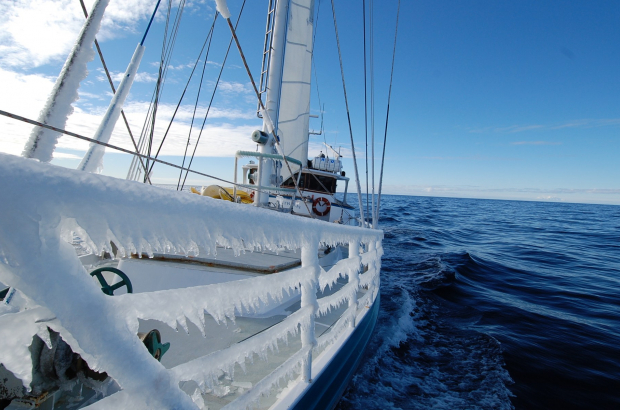- Daily & Weekly newsletters
- Buy & download The Bulletin
- Comment on our articles
Researchers sailing to Antarctica hope for second time lucky
When the sailing ship Australis sets out from Ushuaia in Argentina on 19 February, the marine researchers on board will all have their hearts in their mouths. This time last year, an engine failure meant they had to abandon their scientific mission a couple of days after setting out. This time, they hope to make it all the way to Antarctica.
Marine researchers usually reach the Antarctic on ice-breakers, massive ships that can crunch through the frozen seas. While hard to stop, these ships cause a lot of disturbance to the environment and are not very nimble.
A small sailing ship, on the other hand, should be able to reach otherwise unstudied locations and have less impact on the environment. But first it needs to make it past Cape Horn and across the Drake Passage.
The Belgica121 expedition combines researchers from Belgian universities. It is led by Bruno Danis, a marine biologist from the Université Libre de Bruxelles, and its chief diver is Francesca Pasotti of Ghent University.
Henrik Christiansen and Franz Heindler from KU Leuven’s Ecology, Evolution and Biodiversity Conservation unit are on-board to study fish. “The main emphasis will be on how these fish live, what they eat and how different populations are genetically connected,” explained Heindler.
“We will use various fishing methods and collect water samples from which we can extract DNA,” Christiansen added. “With this environmental DNA – for instance from animal skin cells left behind in the water – it may be possible to survey biodiversity non-invasively. And good biodiversity data are crucial to detect and monitor responses to climate change and other processes.”
Quentin Jossart of the Vrije Universiteit Brussel, will look at the diversity and distribution of starfish in the Southern Ocean, while other members of the team will be studying seabirds, mussels, zooplankton, and bacteria. Together, the data and samples collected will provide an insight into how climate change is affecting the whole Antarctic ecosystem.
A second research topic is assessing how much microplastic has made it into the Southern Ocean. “Detecting and quantifying potential plastic contamination and determining its distribution between the various components of the marine system,” said Danis, “are some of the steps required to estimate its impact on ocean ecosystems.”
Photo: The Australis sets sail later this month ©Belgica120















